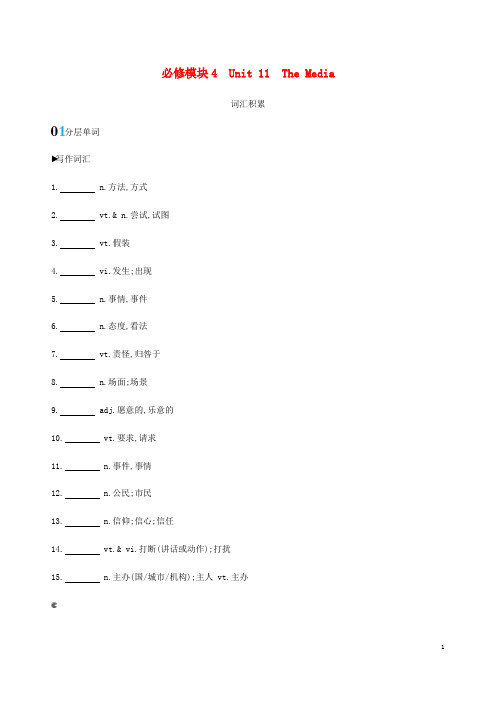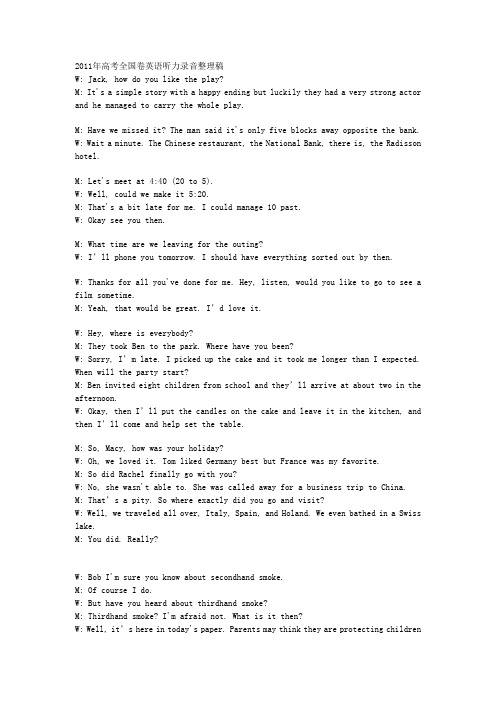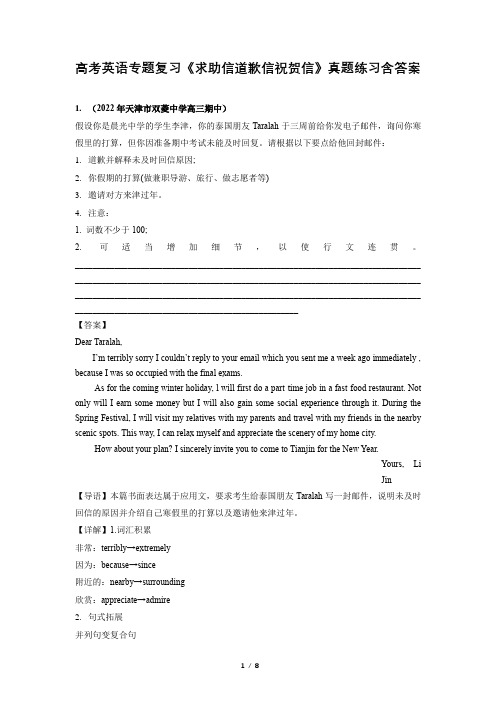【英语】北大附属中学2011届高三精品复习资料:高考英语语音
2011北京高考英语

2011 Beijing High School Entrance Examination EnglishIntroductionThe 2011 Beijing High School Entrance Examination English test was an important milestone for students in Beijing, China. It played a crucial role in determining their future academic path and served as a measure of their English language proficiency. In this article, we will analyze the content and structure of the 2011 exam, highlight its significance, and provide tips for students preparing for future exams.Exam StructureThe 2011 Beijing High School Entrance Examination English test comprised three main sections: Listening, Reading, and Writing. Each section assessed different language skills and contributed to the overall score of students.ListeningThe Listening section aimed to eval uate students’ ability to understand spoken English in various contexts. It consisted of multiple-choice questions wherein students listened to audio recordings and selected the appropriate response or answer.ReadingThe Reading section tested students’ c omprehension skills through a variety of reading passages, such as articles, dialogues, and advertisements. Students were required toanswer questions based on the information provided in the passages, including vocabulary usage, inference, and main idea identification.WritingThe Writing section assessed students’ ability to express themselves in written English. They were expected to write coherent and well-structured essays on given topics, demonstrating their understanding of grammar, vocabulary, and organization.Significance of the ExamThe 2011 Beijing High School Entrance Examination English test held great significance for students for several reasons.Academic PathThe results of the exam were a crucial factor in determining the academic path of students. Based on their scores, students were allocated to different high schools and programs, shaping their future educational opportunities and potential career paths.English ProficiencyEnglish has become an increasingly important language globally, and proficiency in English is seen as a valuable skill in various fields. The exam tested students’ English language abilities, making it a significant factor in assessing their language proficiency.CompetitionThe exam also represented a highly competitive atmosphere among students. Given the limited number of desirable high schools and programs, students strived to achieve high scores to secure their desired placements. The exam results were often seen as a reflection of students’ academic abilities and competitiveness.Tips for PreparationPreparing for the 2011 Beijing High School Entrance Examination English test required students to focus on various aspects, including language skills, exam format, and effective study strategies. Here are some tips to aid in preparation for future exams:1.Develop Listening Skills: Dedicated practice inlistening to English audio recordings will improvecomprehension skills and help students becomecomfortable with different accents and speech patterns.2.Enhance Reading Comprehension: Regularreading of English-language books, articles, and news can enhance vocabulary, improve reading speed, and helpstudents grasp the main ideas of different types of texts.3.Grammar and Vocabulary: Understanding andpracticing essential grammar rules and expandingvocabulary knowledge through word lists, flashcards, and continuous practice will enhance overall language skills.4.Essay Writing Practice: Developing a good writingstructure, focusing on grammar and vocabulary, andfamiliarizing oneself with different essay topics cansignificantly improve writing skills.5.Mock Tests: Taking simulated exams under realexam conditions helps students become familiar with the test format, time management strategies, and identify areas for improvement.6.Time Management: Practicing time managementduring preparation and in the actual exam is crucial.Students should learn to allocate sufficient time to eachsection without rushing or spending excessive time on any particular question.ConclusionThe 2011 Beijing High School Entrance Examination English test was a significant milestone for students in Beijing, determining their academic path and assessing their English language proficiency. By understanding the exam structure, recognizing its significance, and following effective preparation strategies, students can increase their chances of success in future exams. With dedication, practice, and proper guidance, students can excel in their English language skills, paving the way for a successful academic journey.。
高考英语学业水平测试复习第三部分题型Ⅰ情景交际课件

五、提供(帮助等)和应答(Offers and responses) 常用表达法: 1.Can/Could/Shall I help you? Would you like me to...? Is there anything(else)I can do for you? Do you want me to...? What can I do for you? Let me do/carry/help...(for you). Would you like some...? 2.Thanks.That would be nice/fine. That's very kind of you. Thank you for your help.
(2)在大多数场合,仅说:Thanks;Thank you;Thanks a lot.是不 够的,还需说些其他表示感激和非常高兴之类的话。如感谢别人 的宴请,可以这么说:The dinner was delicious.Thank you for your invitation. 三、道歉、遗憾和应答(Apologies, regrets & responses) 常用表达法: 1.Sorry./Pardon. I'm terribly/awfully sorry./I'm sorry for(about)... I'm sorry to.../have done that... I apologize. Forgive me (for...). I really didn't meavor of you? Would you do me a favor? Be kind enough to tell me the truth. 2.Yes./Sure./Certainly. Yes, (do) please. Of course(you may). Go ahead, please. That's OK/all right. Not at all. Well, if I can. I'd be glad to. With pleasure.
高考英语一轮复习必修模块4UNIT11THEMEDIA词汇积累北师大版

必修模块4 Unit 11 The Media词汇积累分层单词▶写作词汇1. n.方法,方式2. vt.& n.尝试,试图3. vt.假装4. vi.发生;出现5. n.事情,事件6. n.态度,看法7. vt.责怪,归咎于8. n.场面;场景9. adj.愿意的,乐意的10. vt.要求,请求11. n.事件,事情12. n.公民;市民13. n.信仰;信心;信任14. vt.& vi.打断(讲话或动作);打扰15. n.主办(国/城市/机构);主人 vt.主办▶阅读词汇1.tobacco n.2.district n.3.widespread adj.4.explode vt.5.innocent adj.6.budget n.7.distinction n.8.photographer n.9.environmental adj.10.contemporary adj.11.reform n.12.concept n.mittee n.▶拓展词汇1. n.信仰;信心;信任→ v.相信2. vt.宣布,宣告→ n.公告3. n.鼓励→ vt.鼓励4. n.广告人员→ vt.为……做广告,登广告→ n.广告5. n.贡献,捐助→ v.捐献6. vt.保卫,防御;为……辩解→ n.保卫;防卫7. vt.雇用→ n.雇用→ n.失业→ n.雇主→ n.雇员8. n.申请(书);应用→ n.申请人→ vi.申请9. adj.高兴的,愉快的→ vt.使愉快 n.快乐,高兴→ adj.令人高兴的10. vt.& n.尊敬,尊重→ adj.受人敬重的→ adj.值得敬重的→adj.尊敬的,表示敬意的11. n.争论;理由→ vi.争吵12. vt.& vi.打断(讲话或动作);打扰→ n.打断13. adj.自然环境的→ adv.环境地→ n.环境答案 1.belief;believe 2.announce;announcement3.encouragement;encourage4.advertiser;advertise;advertisement5.contribution;contribute6.defend;defence7.employ;employment;unemployment;employer;employee 8.application;applicant;apply9.delighted;delight;delightful 10.respect;respected;respectable;respectful11.argument;argue12.interrupt;interruption 13.environmental;environmentally; environment高频短语1. 赞同,支持2. 突出,显眼3. 详细地4. 着手干;开始做5.as long as6.be linked to/with7.stand for8.consist of9.help out10.be harmful to11.be made up of12.look forward to13.owe...to...答案 1.in favour of 2.stand out 3.in detail 4.go ahead with…………组成9.帮忙做某事;帮助克服困难………………归功于……经典句型1. (只要我们不失去信心) and keep on trying, we are sure to get over difficulties and achieve our aims.2.What the students do in their spare time is of (很重要).3. (不是一切)she did pleased him.4.I strongly feel that (无论我们的朋友们做什么) does matter to us.答案 1.As/So long as we don’t lose heart 2.great importance。
高中英语北师大版高一下册《Unit11The Media Lesson2The Papar

词汇三 willing adj. 愿意的,乐意的 ◆要点必记 be willing to do sth. 愿意做某事 be unwilling to do sth. 不愿意做某事 willingly adv. 情愿地 unwillingly adv. 不情愿地 ◆单句写作
(1) I am willing to admi(t 愿意承认)that I do make mistakes. (2) Why might highly sensitive people be unwilling t(o 不愿意)take part in group
sports?
词汇四 employ v. 雇用;使用,采用
◆要点必记
employ sb. as 雇用某人担任某职务
employ sb. to do sth. 雇用某人做某事
be employed in(doing) sth. = employ oneself in(doing) sth. 忙于(做)某事,从事某 活动
process...into... 把……加工成……
◆词语积累 processed adj. 经加工的,加工过的
◆单句写作
(1)[词汇复现]The translation is in the process o(f正在)being turned into a
television series.
(2)Studies have shown that the right and left earprocess sound differently(处理声音
(6)[词汇复现]Should the need
for extra staff,we will contact you.
(7)As the sun
2011年高考英语全国卷听力试题及录音材料

2011年普通高等学校招生全国统一考试英语(听力部分)第一部分听力 (共两节,满分30分)做题时,先将答案标在试卷上。
录音内容结束后,你将有两分钟的时间将试卷上的答案转涂到答题卡上。
第一节(共5小题;每小题1.5分,满分7.5分)听下面5段对话。
每段对话后有一个小题,从题中所给的A、B、C 三个选项中选出最佳选项,并标在试卷的相应位置。
听完每段对话后,你都有10秒钟的时间来回答有关小题和阅读下一小题.每段对话仅读一遍。
例:How much is the shirt?A.£19.15.B.£9.15.C.£9.18.答案是B.1.What does the man like about the play?A.The story.B.The ending.C.The actor.2. Which place are the speakers trying to find?A.Hotel.B.Bank.C.Restaurant.3.At what time will the two speakers meet?A.5:20.B.5:l0.C.4:40.4.What will the man do?A.Change the plan.B.Wait for a phone call.C.Sort things out.5.What does the woman want to do?A.See a film with the man.B.Offer the mall some help.C.Listen to some great music.第二节(共1 5小题:每小题分,满分22.5分)听下面5段对话。
每段对话后有几个小题,从题中所给的A、B、C三个选项中选出最佳选项,并标在试卷的相应位置。
听每段对话前,你将有时间阅读各个小题,每小题5 秒钟:听完后,各小题给出5秒钟的作答时间。
每段对话读两遍。
听第6段材料,回答第6、7题。
北大附属中学2011届高三英语精品资料-短文改错

北大附属中学 2011 届高三英语精品复习资料:英语短文改错【命题趋向】短文改错是一项主要测试考生的判断能力, 观察能力、 纠错能力语言基础知识及语言的综合运用能力。
短文改错的趋势:1.改错短文以记叙文和说明文为主。
2.文章内容贴近学生生活,没有生僻词汇和复杂的结构,文章简单易懂,错误设置也很 简单,多为学生平常作文中常出现的错误。
3.短文一般 100 词左右,错误有 9 处。
4.常见错有三种 :错词、多词、 缺词。
错词占 60%左右 【错误类型 】 1. 错词 2. 多词2007 年全国卷 I2007 年 全 国 卷 II2007 年陕西卷 I【考点透视】一.错词的热点1. 动词 — 时态 语态 非谓语 ;主谓关系。
2. 联系词 — 关系代词和关系副词;连词;连接词。
3. 名词 — 可数名词 、不可数名词,可数名字的单复数变化。
4. 介词 — 介词和动词的搭配错误。
5. 形容词 /副词 — 词类错用。
6. 冠词 — 定冠词和不定冠词的错用。
7. 代词 — 人称代词;物主代词;反身代词。
8. 惯用法 — 固定句型,固定短语。
二.多词和缺词热点 1. 冠词 2.介词 3.副词 4.代词 5.关联词 6.小品词 to【短文改错主要特点 】 1. 语言材料取自于学生的习作。
2. 短文为贴近学生生活的话题或学生身边事。
3. 短文难度符合学生水平。
4. 语言简单易懂。
5. 没有生僻的语言现象或繁难的语句结构。
【例题解析】3. 缺词 错词4. 正错 多词缺词正错 71 1 1 71116211一.错词1.动词错误:(1)时态和语态、主谓一致的错误。
【1】整体时态:*Then I ask him ―Grandma, how come you have so much lines on your hand ‖全文为故事,故ask 改为asked。
*High over the water, they discover a hole in the balloon.The hole became bigger and bigger.全篇使用过去时态,故改discover- -discovered【2】主谓一致*Having fun with their friends make them happy.动名词短语做主语,谓语动词用单数形式makes。
2011年高考全国卷英语听力录音整理稿

2011年高考全国卷英语听力录音整理稿W: Jack, how do you like the play?M: It's a simple story with a happy ending but luckily they had a very strong actor and he managed to carry the whole play.M: Have we missed it? The man said it's only five blocks away opposite the bank. W: Wait a minute. The Chinese restaurant, the National Bank, there is, the Radisson hotel.M: Let's meet at 4:40 (20 to 5).W: Well, could we make it 5:20.M: That's a bit late for me. I could manage 10 past.W: Okay see you then.M: What time are we leaving for the outing?W: I’ll phone you tomorrow. I should have everything sorted out by then.W: Thanks for all you've done for me. Hey, listen, would you like to go to see a film sometime.M: Yeah, that would be great. I’d love it.W: Hey, where is everybody?M: They took Ben to the park. Where have you been?W: Sorry, I’m late. I picked up the cake and it took me longer than I expected. When will the party start?M: Ben invited eight children from school and they’ll arrive at about two in the afternoon.W: Okay, then I’ll put the candles on the cake and leave it in the kitchen, and then I’ll come and help set the table.M: So, Macy, how was your holiday?W: Oh, we loved it. Tom liked Germany best but France was my favorite.M: So did Rachel finally go with you?W: No, she wasn't able to. She was called away for a business trip to China. M: That’s a pity. So where exactly did you go and visit?W: Well, we traveled all over, Italy, Spain, and Holand. We even bathed in a Swiss lake.M: You did. Really?W: Bob I'm sure you know about secondhand smoke.M: Of course I do.W: But have you heard about thirdhand smoke?M: Thirdhand smoke? I'm afraid not. What is it then?W: Well, it’s here in today's paper. Parents may think they are protecting childrenfrom secondh smoke when they smoke outside their home or only when the children are not there. But now researchers are warnning about what they call thirdhand smoke. When you smoke, dangerous matter from cigarrettes gets into your hair and clothing, and as babies are the weakest when you come to a baby, you pass it to the baby and increase the chances of disease in the baby.M: Is that so? In that case, I have to say that I should never get close to a baby. W: That’s right. Actually all smoking parents should do the same or better give it up completely.M: Hello, welcome to our program Today's City. I’m Larry. We are going to Louisville Kentucky where our guest Michelle Ray comes from. She is proud of her middle sized city with a small-town feel and big city dreams. Now, Michelle tell us about your city.W: Thank you, Larry. Here’s my city. Louisville is my city. The first place I take a visitor from out of town is to the Highlands for shopping and nightlife. When I have delicious Asian food, I always go to the Zen garden which provides wonderful all vegetable dishes.M: Vow, that's interesting. Many people go for healthy food now.W: You can say that again. If I want to go camping and fishing, I go to the Red River area. For complete quiet, I can hide away in my house with a good book from one of our public libraries.M: That all sounds very exciting. I'm sure some of our listeners will include Louisville in their travel plan for their next holiday. Thank you, Michelle.M: We are glad to have Dr. Garfield to talk to us today about dreams. Let me start by asking the first question: does everyone dream?W: It appears that everyone does. Mostly when people say that they never dream, what they really mean is that they don't remember their dreams or they don't think their dreams are important. The reason behind is that they might have been made fun of as a child when they first reported their dreams or it was so frightening that they just turned off dreaming completely. The other day someone named Davis came to me and said that he used to be a great dreamer. But suddenly he stopped having dreams.I asked him what had happened. It turned out that his brother died of a heart attack and he never expected that such a terrible thing would happen to a young person. Generally when there was an frightening event and to dream about it was too terrible, people prefer not to dream about it. Actually the worst thing you can do is stop dreaming because it means that the bad experience was too painful to even appears in dreams. As long as you're dreaming about it and even if the dreams are frightening, your mind is working on it. My personal opinion about what dreams do is that they help us deal with our problems. We see certain patterns take place in dreams when a person is hurt deep inside, when a person is seriously ill or when a person has been really sad. If people turn off their dreams totally, it means they don't allow themselves to even think about it.听力参考答案:1.C2.A3.B4.B5.A6.C7.B8.A9.C 10.B 11.C 12.A 13.A 14.B 15.C 16.C 17.A 18.B 19.A 20.C。
高考英语专题复习《求助信道歉信祝贺信》真题练习含答案

高考英语专题复习《求助信道歉信祝贺信》真题练习含答案1.(2022年天津市双菱中学高三期中)假设你是晨光中学的学生李津,你的泰国朋友Taralah于三周前给你发电子邮件,询问你寒假里的打算,但你因准备期中考试未能及时回复。
请根据以下要点给他回封邮件:1.道歉并解释未及时回信原因;2.你假期的打算(做兼职导游、旅行、做志愿者等)3.邀请对方来津过年。
4.注意:1. 词数不少于100;2. 可适当增加细节,以使行文连贯。
_______________________________________________________________________________ _______________________________________________________________________________ _______________________________________________________________________________ ___________________________________________________【答案】Dear Taralah,I’m terribly sorry I couldn’t reply to your email which you sent me a week ago immediately , because I was so occupied with the final exams.As for the coming winter holiday, l will first do a part-time job in a fast-food restaurant. Not only will I earn some money but I will also gain some social experience through it. During the Spring Festival, I will visit my relatives with my parents and travel with my friends in the nearby scenic spots. This way, I can relax myself and appreciate the scenery of my home city.How about your plan? I sincerely invite you to come to Tianjin for the New Year.Yours, LiJin【导语】本篇书面表达属于应用文,要求考生给泰国朋友Taralah写一封邮件,说明未及时回信的原因并介绍自己寒假里的打算以及邀请他来津过年。
- 1、下载文档前请自行甄别文档内容的完整性,平台不提供额外的编辑、内容补充、找答案等附加服务。
- 2、"仅部分预览"的文档,不可在线预览部分如存在完整性等问题,可反馈申请退款(可完整预览的文档不适用该条件!)。
- 3、如文档侵犯您的权益,请联系客服反馈,我们会尽快为您处理(人工客服工作时间:9:00-18:30)。
北大附属中学2011届高三英语精品复习资料:
高考英语语音
【命题趋向】
语音基础知识的考查是陕西等省近几年的必考试题。
语音试题属于英语基础知识的考查,主要考查学生的辩音能力。
从这两年的试题中不难发现如下一些特点:
(1)05-07年全国卷子和陕西卷子里,考查元音、辅音、字母组合,偏重考查字母组合。
试卷里考了3个字母组合。
(2)许多元音字母,辅音字母,字母组合的发音反复考查。
例如:o/u/a ;c;ou/ear/th/er/ ie/ai (3)近几年下列单词考了2次:occur ;offer ;ocean ;bargain ;official
(4)语音考查的单词很常用,不生僻。
【考点透视】
语音试题的考点如下:
(1)元音字母在不同单词中的发音,考查的5个元音字母是:a e o i u
(2)考查辅音字母在不同单词中的发音,考查的辅音字母是:g h c n t s
(3)考查字母组合在不同单词中的发音, 考查的字母组合包括:元音组合、辅音组合和元音字母组合。
元音组合。
例如:ou ea oo ie ei ai au
辅音组合。
例如:ch th ph cc
元辅音字母组合。
例如: al ex ow tion sion ay ai ed re ar are ear ur ire eer
tion ture
(4)考查不发音字母。
例如:b (clim b); t (Chris t mas ) ;gh (fi gh t );d (We d nesday )
(5)前后缀的发音。
un- im- dis- -er –or –ed –tion –ly
【例题解析】
(1).2007年陕西英语试题语音题考点分析:
考查要点:元音字母:o字母组合:ie th ai辅音字母:c
1. suc c ess A. offi c ial B. ex c use C. c orrect D. ex c iting
答案:D. 解析:该题考查辅音字母c发[s] [k] [ʃ] 的辨析。
注意:a cc ess a cc ident中cc的发音:[ks]
2. soc ie ty A. ach ie ve B. fr ie nd C. sc ie nce D. bel ie ve
答案:C. 解析:该题考查字母组合ie发[i:] [e][aiƏ]的辨析。
注意:字母组合ie/ei的常见发音:
例如:*[aiƏ]d ie t qu ie t
*[i:]rec ei ve s ei ze c ei ling ach ie vement ch ie f p ie ce th ie f
3. th eirs A. th read B. smoo th C. th irsty D. heal th
答案:B. 解析:该题考查字母组合th发[θ] [ð]的辨析。
4. r ai se A. rem ai n B. cert ai n C. mount ai n D. barg ai n
答案:A. 解析:该题考查字母组合ai发[ei] [Ə] [i]的辨析。
注意:字母组合ai的常见发音:
例如:* [i]capt ai n portr ai t
* [ei]f ai lure rem ai n str ai ght
5. c o mpare A. c o mpany B. c o ntinue C. c o mmon D. c o ncert
答案:B. 解析:该题考查元音字母o发 [ʌ] [Ə] [Ɔ]的辨析。
注意:元音字母o的发音:
例如:* [Ɔ]gone fond motto obviously opposite
* [ʌ]stomach lovely
*[Ə]position observe European
(2).2007年全国二卷语音试题分析:
考查要点:元音字母:o a字母组合:th ou 辅音字母:c
1. st o p A. l o se B. w o man C. sh o ck D. r o se
答案:C解析:该题考查元音字母o发[Ɔ] [u׃] [i][Əu]的辨析。
2. brea th e A. th ick B. sou th ern C. ma th ematics D. me th od
答案:B 解析:该题考查辅音组合th发[θ][ð]的辨析。
3. gr ou nd A. h ou se B. c ou ntry C. gr ou p D. c ou gh
答案:A 解析:该题考查元音组合ou发[аu] [ʌ] [u׃][Ɔ]的辨析。
4. c enter A. o c ean B. de c ided C. c ause D. so c ialist
答案:B 解析:解析:该题考查辅音字母c发[s] [k] [ʃ] 的辨析。
5. a nimal A. a che B. a nything C. a dvance D. a nxious
答案:D 解析:该题考查元音字母a发[æ] [еi] [е] [Ə]的辨析。
(3).2006年陕西英语试题语音题考点分析:
考查要点:元音字母:o字母组合:ou ear ire eer are ed辅音字母:h
1. o ccur A. o cean B. p o ssible C. p o sition D. o ffer
答案:C. 解析:该题考查元音字母o发[Ə][Əu] [Ɔ]的辨析。
注意:元音字母o的发音:
例如:在重读音节中:
*[Əu] ocean h o me c o mb
*[Ɔ] s o lid bi o logy c o mmunist
*[ʌ] st o mach d o zen d o es
例如:在非重读音节中:
*[Əu] envelop
*[Ə] complete common
例如:词形和词性变化时,该音的变化:
troubles o me [Ə]---s o me [ʌ];w o man [u]--- w o men [i];p o litical [Ə]---p o litics [Ɔ] 2. en ou gh A. t ou ch B. m ou th C. s ou l D. sh ou t
答案:A. 解析:该题考查字母组合ou发[ʌ] [аu][Əu]的辨析。
注意:元音字母组合ou的常见发音:
例如:
*[аu] c ou nt f ou nd s ou th tr ou sers m ou ntain c ou nty
*[ʌ]c ou rage c ou sin t ou gh s ou thern t ou ch d ou ble tr ou ble c ou ntry。
